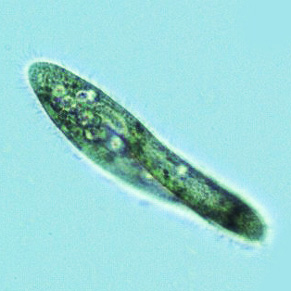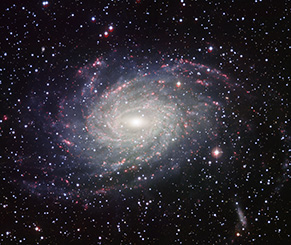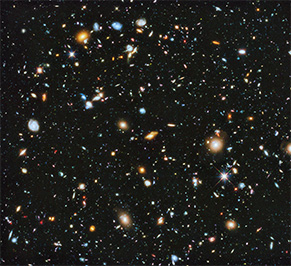3:00pm, 1st November 2016
New Story: Quartet of the Far Blown Winds @ FFO
Quartet of the Far Blown Winds is a story about distance, loneliness, and the vast empty reaches of space. It's about the Fermi Paradox, and my answer to it.
The Fermi Paradox, and the numbers therein
I would expect most of you are familiar with this anyway, but in brief, the Fermi Paradox is thus: where are all the aliens?
Life started on Earth as early as 4.1 billion years ago, only 400 million years after the planet formed from the accretion disk around the young Sun. That's essentially as soon as conditions were settled enough for it to begin--and it could have been even earlier than that, except that the geological unrest of the Hadean Eon has likely destroyed any evidence. It seems, then, that life couldn't wait to get started.
At the moment we only have a sample size of one for discussing the rise of life, but even so, that looks almost like an inevitability.
 That early life, though, was single celled and very simple. It took another 2.3 billion years for the leap in complexity to eukaryotic cells, the cells that you and I are made up of with a nucleus, mitochondria etc. It then took another billion years after that for these eukaryotic cells to organise into the first multicellular life, about 800 million years ago. That's 3.3 billion years from the first biotic life to the first multicellular life. Considering it only took 400 million years for that initial spark--and it was likely impossible for it to arise for the first 2-300 million of those years, due to the heat and toxicity of early Earth--it's clear that the leap to multicellular organisation is a big one. If life appears common, multicellular life might still be exceedingly rare--even unique to Earth. This is one possible answer to the paradox.
That early life, though, was single celled and very simple. It took another 2.3 billion years for the leap in complexity to eukaryotic cells, the cells that you and I are made up of with a nucleus, mitochondria etc. It then took another billion years after that for these eukaryotic cells to organise into the first multicellular life, about 800 million years ago. That's 3.3 billion years from the first biotic life to the first multicellular life. Considering it only took 400 million years for that initial spark--and it was likely impossible for it to arise for the first 2-300 million of those years, due to the heat and toxicity of early Earth--it's clear that the leap to multicellular organisation is a big one. If life appears common, multicellular life might still be exceedingly rare--even unique to Earth. This is one possible answer to the paradox.
But there are between 100 and 400 billion stars in the Milky Way. With the recent results from the Kepler mission, it seems reasonable to suppose each solar system has at least 3-4 planets, with at least one of them in the Goldilocks zone, where the distance from the star is such that the temperature is just right for liquid water (which is, as far as we know, a prerequisite for life; we know of no terrestrial life that doesn't need it). There is potentially a galactic Goldilocks zone, not too close to the radioactive centre but not so far out where the metallic elements are rarer, that might limit complex intelligent life to 0.3% of the stars in the galaxy. Even so, the current evidence suggests that, conservatively, there are at least 300 million (300,000,000) planets in the Milky Way alone capable of supporting life, and as many as 4.8 billion (4,800,000,000).
 And it's just been announced that there may be as many as two trillion galaxies in the observable Universe.
2,000,000,000,000.
And it's just been announced that there may be as many as two trillion galaxies in the observable Universe.
2,000,000,000,000.
2,000,000,000,000 galaxies x 100,000,000,000 stars in our galaxy (lower bound, assuming we're average--not unreasonable, on the evidence) x 0.3% galactic habitability (lower bound) = at least 600,000,000,000,000,000,000 planets capable of supporting intelligent civilizations. 600 quintillion. Use the numbers from the upper bounds and it could be as many as nine sextillion 600 quintillion (9,600,000,000,000,000,000,000).
Intelligent life may be rare, but for us to be unique it would have to be 99.99999999999999999983% against developing in conditions otherwise favourable to it.
So where the hell is everyone?
Well for one, intergalactic civilizations strike me as exceedingly unlikely. Our nearest galactic neighbour, on a collision course with us no less, is Andromeda.
It's 2.5 million light years away. When the light we now see left its stars, humans--or what passed for humans back then, Australopithecus africanus--were [just starting to use rocks as tools](Australopithecus africanus).
That's almost unimaginable. Surely insurmountable. And when each galaxy is so full of planets and resources, why go to all the effort to maroon yourself in the next galaxy over?
So I suspect that the only life we're ever likely to know of, let alone meet, will be in this galaxy.
 That said, even the Milky Way is enormous beyond comprehension--as much as 150,000 light years across. The average distance between stars is about 5 light years. There's an awful lot of, well, space in space. It's really spread out.
That said, even the Milky Way is enormous beyond comprehension--as much as 150,000 light years across. The average distance between stars is about 5 light years. There's an awful lot of, well, space in space. It's really spread out.
And more than that: the galaxy is 13.21 billion years old. We, homo sapiens, us, have been around for no more than 1.8 million years as a species, 0.01363% of that time. We've only been civilized since 6500BCE--8,500 years against 13,210,000,000. 0.000064% of the lifespan of the galaxy.
If there's life out there, the odds are overwhelmingly that we're not only looking in the wrong place, we're looking in the wrong time. We're probably not the only intelligent life to arise in the galaxy, but we're probably the only intelligent life within a reasonable (ha!) distance right now.
We may as well be alone.
Who the hell is everyone else anyway?
There's a quote I remember seeing years ago that I cannot, for the life of me, track down again. But it has stuck with me for over half a lifetime.
To paraphrase as best I can recall: even if butterflies could talk, what could we possibly discuss with them? What common ground have we got to base communication and conversation on?
Our experience of reality is so subjective, so personal, that we can barely bloody well talk to each other at times. How could we even talk to some of the other life on Earth? What would you say to an ant? A chameleon? A deep sea anglerfish?
So even if we're not alone--who's to say we'd be able to engage with it anyway, if we could even recognise it?
No, we're not alone. The numbers are too ridiculous. It's improbable beyond all reckoning that we are the only life that has ever or will ever arise in the galaxy, let alone the Universe.
But we're the only life like us. We may as well be alone.
And thus: the Quartet of the Far Blown Winds.
--Matt
&
TAGS: fermi paradox, new story, science, science fiction